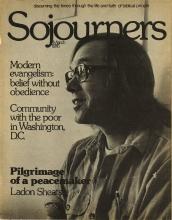I say this not as a command, but to prove by the earnestness of others that your love also is genuine. For you know the grace of our Lord Jesus Christ, that though he was rich, yet for your sake he became poor, so that by his poverty you might become rich. -- 2 Corinthians 8:8-9
Regarding the subject of renewal in structures of church leadership, how often I have been asked, “What personal attitude on the part of Christian leaders, especially clerics, would help promote the cause of church renewal in the present day?” only to find the answer -- and often the question as well -- lost in a gamut of responses ranging from fidgety embarrassment to vociferous outrage.
Remembering that it was during a three-year common life with an itinerant messiah that the earliest church leaders received a lively and effectual faith for their consciousness of being both the church and its eventual leaders, we ought not to be greatly surprised if much of what surely must have been their attitude toward themselves and their personal lives eludes us in our twentieth century western comfort. They learned from the style of Jesus’ life and from his teaching as well. Take his thoughts about poverty: the “poor in spirit” of Matthew 5 and the “poor” of Luke 6. Was Jesus commending the poor for their poverty and condemning the rich simply for their riches? That is to say, was he in some sense making poverty a virtue in itself? I think not. It was for the relief of the poor's condition that he came among them to preach the good news of release; so-called holy poverty -- a pious estate desired by elitist groups of Christians seeking perfection -- was a post-biblical development not easily supported by his teaching.
Read the Full Article

